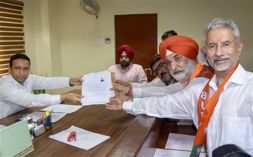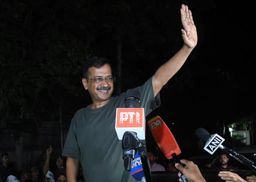
Make them Employable: We must liberate education from the market forces. MBA students at a private university in Mohali. Tribune photo: Vicky Gharu
GS Bedi
EDUCATION is the alchemy that can take India to its next golden age”, said the outgoing President, Pranab Mukherjee during his farewell address to the nation. True. After all, it was the universities where the great ideas of liberty, tolerance and constitutional governments took root along with the scientific research and development which ultimately led to the enlightenment and prosperity of Europe.
Yet, the way we are experimenting with our higher education system, it can happen otherwise. In our quest to improve the Gross Enrolment in the country, we let the private universities and institutes mushroom indiscriminately. Today, these account for over 60 per cent of total institutes in the country.
The quality of higher education has taken a severe hit with the advent of private universities. Barring a few, they are struggling for survival. To survive, they have adopted a simple modus operandi: lure the students with the promise of degrees without going through the rigour of attendance and passing the examinations.
A typical case study of the journey of a student through the portals of a private university may be instructive for policy makers framing the new education policy. A private university runs a B.Tech programme that has not been approved by the All-India Council of Technical Education (AICTE). But it does not matter. The university has the convenient alibi that it has been constituted by the University Grants Commission (UGC) and it has nothing to do with the AICTE. Analysing it, one finds the university may not even have been inspected by the UGC even after five years of its operation even though it has been conferring degrees year after year. It is hoped that Ministry of Human Resource Development and Niti Aayog's proposal to merge the UGC and the AICTE into a single authority, the Higher Education Empowerment Regulation Agency (HEERA) will end such fraudulent practices.
Another example: A student seeks admission to a B.Tech programme. The criteria as laid down by the Regulatory Commission for admission to B.Tech programmes is a valid score in the JEE (mains) examination. It does not specify the cut-off score. Since it does not do so, the private university admits the student even if he has a “zero” score in the JEE examination — a mockery of the admission criteria. The particular program me in which the student has taken admission may have only “one” student, that is he himself. Optimal size, be it of a class or the university, is an important attribute of higher education as the students learn from each other. Their personality and leadership qualities develop only in groups. The Yash Pal Committee had specially laid emphasis on the optimal size of the university in its report on “Renovation and Rejuvenation of Higher Education”. Whereas autonomy is a blessing for a public university like that of the Panjab University, it is a license for unethical practices for a private university. Most states do not have regulatory authorities for private educational institutes. Even the states where there is one like Himachal Pradesh, it is without a chairman/chairperson for the last more than one-and-a-half year making it ineffective.
The result of this license is that the teacher in a private university who teaches the subject sets the question paper and evaluates the answer script. In the absence of an “external university audit system”, there is a conspiracy of silence between the student, teacher and the Vice-Chancellor as to how much of syllabus has been covered or how many right answers the students have given.
The two pillars of quality of education are good faculty and infrastructure. Both are missing in case of the private universities. Private universities exploit faculty members by paying them low salaries and overloading them with a large number of courses. Some of them pay a salary even lower than that of a peon in a government high school. As regards infrastructure, some of them do not have sports grounds and hostel facilities.
To make the provision of a hostel, they have converted cabins of the faculty into hostel rooms. With two beds in a small 8ft x 8 ft cabin, it is more like a jail cell than a hostel. Curriculum of the various programmes is not upgraded in accordance with the skill sets required for industry. This is a double whammy. In the first place, it produces unemployable youth. Second, irrelevant research is of no use to the manufacturing sector which generates jobs.
The root cause of the poor quality of education at private universities is absence of leadership at the Vice Chancellors' level. Old retired and re-retired persons are employed as Vice Chancellors. They neither have any ability nor independence to run the university effectively. Only the owners call the shots. It is from one such private university that the student gets his degree certificate at the end of the programme but he remains unemployable. As per the recent National Employability Report, 75 per cent of our graduates are unemployable.
This is a far more serious situation than “not being in top 200”. Setting up elite institutions like IIT will not solve our problems. Radical reforms are required at the bottom of pyramids.on war footing. Education is far too serious a business to be left to the vagaries of market forces. The government must step in fast and announce a much-needed new education policy. Unfortunately, our squeaks about educational reforms are lost in the din of “Make-in India, Stand -up India, Start-up India, Skill-India” and so on. Ironically, the success of all these depends upon the quality of higher education.
There is a need for the government to operate in a public-private partnership mode with the viable private universities. For this, the government will have to increase its budgetary provision for education to at least more than 5 per cent of the GDP. As an interim measure, the private universities which have not been able to gain traction with respect the optimal size for the last five years must be wound up or merged to form a bigger university which is financially viable both in the short and the long term.
The UGC scheme of Credit Transfer must be used effectively to co-opt the experienced professional and administrators from the industry to function as Vice Chancellors or Registrars by considering their experience for certain number of years in the industry as equivalent to Ph.D. The state government must order an academic audit of all the private universities immediately and close down the ones not up to the mark. At the same time, each state must have a functional private education regulatory authority which should oversee all the aspects of teaching, examination and certification.
Implementing the educational reforms as recommended by the Prof Yash Pal Committee in letter and spirit will be a fitting tribute to an eminent educationist.
The writer is a freelance writer on educational matters



























